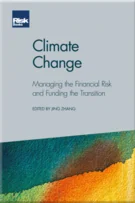Scenario Analysis Modelling
Scenario Analysis Modelling
Introduction
Collection of Operational Loss Data: ILD and ED
Scenario Analysis Framework and BEICFs Integration
Loss Data Modelling: ILD and ED
Scenario Analysis Modelling
BEICFs Modelling and Integration into the Capital Model
Hybrid Model Construction: Integration of ILD, ED and SA
Derivation of the Joint Distribution and Capitalisation of Operational Risk
Backtesting, Stress Testing and Sensitivity Analysis
Evolving from a Plain Vanilla to a State-of-the-Art Model
Strategic and Operational Business Planning and Monitoring
Risk–Reward Evaluation of Mitigation and Control Effectiveness
Having presented methods for loss data modelling in Chapter 4, we now examine scenario analysis (SA) modelling for its integration into the capital model, either the hybrid model or scenario-based approach. In fact, SA permits us to incorporate, into a capital model, institution-specific, high-impact risk information that can be obtained only from expert judgement due to its low frequency. This requires the translation of scenario results in distributions models that can be incorporated into the joint loss distribution for the derivation of capital estimates
On this topic, BCSG-AMA says, “A bank should thus ensure that the loss distribution(s) chosen to model scenario analysis estimates adequately represent(s) its risk profile.” The process of choosing SA loss distribution that adequately represents the scenario risk profile can be performed through the following processes corresponding to this chapter:
- □
“Translating scenario analysis results into distribution characteristics”;
- □
“Fitting a full distribution to scenario analysis”;
- □
“Distribution shape control during the scenario distribution fit”: this section describes how to arrive at a reasonable tail
Copyright Infopro Digital Limited. All rights reserved.
As outlined in our terms and conditions, https://www.infopro-digital.com/terms-and-conditions/subscriptions/ (point 2.4), printing is limited to a single copy.
If you would like to purchase additional rights please email info@risk.net
Copyright Infopro Digital Limited. All rights reserved.
You may share this content using our article tools. As outlined in our terms and conditions, https://www.infopro-digital.com/terms-and-conditions/subscriptions/ (clause 2.4), an Authorised User may only make one copy of the materials for their own personal use. You must also comply with the restrictions in clause 2.5.
If you would like to purchase additional rights please email info@risk.net






